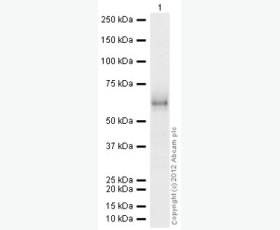Recombinant Human E-Selectin//ELAM1/CD62E
| Product name: | Recombinant Human E-Selectin//ELAM1/CD62E |
| Source: | Human Cells |
| Purity: | Greater than 95% as determined by reducing SDS-PAGE. |
| Buffer Formulation: | Lyophilized from a 0.2 μm filtered solution of PBS, 4% Mannitol,pH7.4. |
| Applications: | Applications:SDS-PAGE; WB; ELISA; IP. |
| Storage: | Avoid repeated freeze/thaw cycles. Store at 2-8 oC for one month. Aliquot and store at -80 oC for 12 months. |
| UOM: | 100ug/50ug/200ug/1mg/1g |
| Source | Human Cells |
| Description | Recombinant Human E-selectin is produced by our Mammalian expression system and the target gene encoding Trp22-Pro556 is expressed with a 6His tag at the C-terminus. |
| Names | E-selectin (SELE), also known as CD62 antigen-like family member E, Endothelial leukocyte adhesion molecule 1, Leukocyte-endothelial cell adhesion molecule 2, CD62E and ELAM1, is a single-pass type I membrane protein which belongs to the selectin/LECAM family. |
| Accession # | P16581 |
| Formulation | Lyophilized from a 0.2 μm filtered solution of PBS, 4% Mannitol,pH7.4. |
| Shipping |
The product is shipped at ambient temperature. |
| Reconstitution |
Always centrifuge tubes before opening. Do not mix by vortex or pipetting. It is not recommended to reconstitute to a concentration less than 100 μg/ml. Dissolve the lyophilized protein in ddH2O. Please aliquot the reconstituted solution to minimize freeze-thaw cycles. |
| Storage |
Lyophilized protein should be stored at < -20°C, though stable at room temperature for 3 weeks. Reconstituted protein solution can be stored at 4-7°C for 2-7 days. Aliquots of reconstituted samples are stable at < -20°C for 3 months. |
| Purity |
Greater than 95% as determined by reducing SDS-PAGE. |
| Endotoxin | Less than 0.1 ng/µg (1 IEU/µg) as determined by LAL test. |
| Amino Acid Sequence |
WSYNTSTEAMTYDEASAYCQQRYTHLVAIQNKEEIEYLNSILSYSPSYYWIGIRKVNNVWVWVGT QKPLTEEAKNWAPGEPNNRQKDEDCVEIYIKREKDVGMWNDERCSKKKLALCYTAACTNTSCSGH GECVETINNYTCKCDPGFSGLKCEQIVNCTALESPEHGSLVCSHPLGNFSYNSSCSISCDRGYLP SSMETMQCMSSGEWSAPIPACNVVECDAVTNPANGFVECFQNPGSFPWNTTCTFDCEEGFELMGA QSLQCTSSGNWDNEKPTCKAVTCRAVRQPQNGSVRCSHSPAGEFTFKSSCNFTCEEGFMLQGPAQ VECTTQGQWTQQIPVCEAFQCTALSNPERGYMNCLPSASGSFRYGSSCEFSCEQGFVLKGSKRLQ CGPTGEWDNEKPTCEAVRCDAVHQPPKGLVRCAHSPIGEFTYKSSCAFSCEEGFELHGSTQLECT SQGQWTEEVPSCQVVKCSSLAVPGKINMSCSGEPVFGTVCKFACPEGWTLNGSAARTCGATGHWS GLLPTCEAPTESNIPVDHHHHHH
|
| Background | SELE is expressed on the surface of endothelial cells and mediates the interaction of leukocytes and platelets with endothelial cells during an inflammatory response. SELE functions as a cell-surface glycoprotein and has a role in immunoadhesion. In addition, SELE may also have a role in capillary morphogenesis. |














